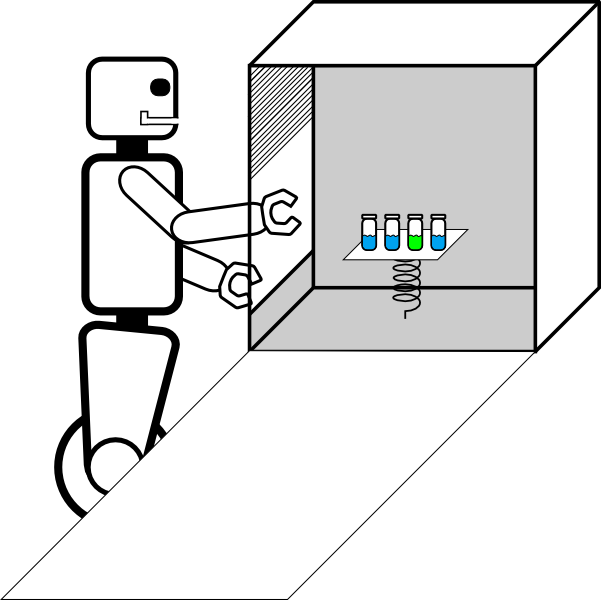The Chemistry Lab of the Future
The Chemistry Lab of the Future project aims to bring Industry 4.0 to today’s chemistry labs. In this project, AI and robotics researchers of the smARTLab collaborate with chemists from the Liverpool University Department of Chemistry, more specifically, the Cooper Group. The goal of this research is to enable researchers to perform more extensive series of experiments by robotic automation, yet instead of relying on bulky and expensive stationary hardware, mobile robots should interconnect already existing laboratory equipment and integrate seamlessly with their human colleagues.
Background

In many industries, laboratories have started to incorporate robotic systems in their day-to-day workflows. Compared to conventional chemistry labs, we wish to improve throughput and reproducibility for the Chemistry Lab of the Future. Concerning throughput, there are natural limits a single robot has to succumb to, as it can not be present in multiple locations at the same time. In order to truly excel in outperforming a human-operated lab, multiple cooperating robots are required. The quality of coordination and synchronization is key for the Chemistry Lab of the Future to be able to scale according to demand, as more robots can produce more potential conflicts. Regarding reproducibility, the robot has to be able to detect potential impurities or disturbances of the workflow. Using advanced machine learning and vision techniques, these requirements shall be met. Recently in the field of computer vision, deep convolutional neural networks have shown their potential. Detailed structural information about chemical apparatus may be obtained by 3D laser scanners. This information can be further used to plan robotic arm trajectories to reach into appliances without collision.
People
The following computer science (CS) and chemistry (CH) researchers are involved in this project:
Prof. Karl Tuyls (CS)
Prof. Katie Atkinson (CS)
Prof. Andy Cooper (CH)
Dr. Ben Alston (CH)
Dr. Michael Briggs (CH)
Benjamin Burger (CH)
Rob Clowes (CH)
Benjamin Schnieders (CS)